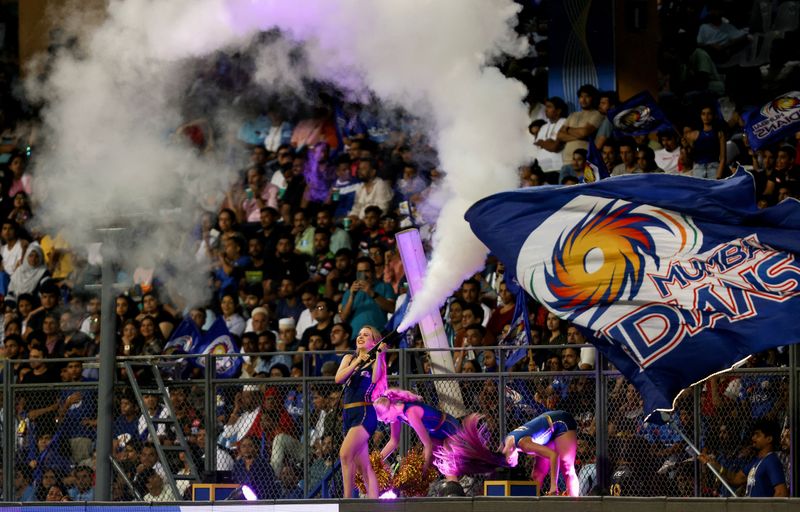
By Munsif Vengattil, Aditya Kalra and Sai Ishwarbharath B
BENGALURU (Reuters) – After striking an $8.5-billion media merger with Walt Disney, Indian billionaire Mukesh Ambani is targeting small businesses and promoting unconventional neuroscience studies to boost its revenues from the IPL, the world’s most valuable cricket league.
The pricey broadcast rights for the Indian Premier League (IPL) and other cricketing events which cost Disney and Reliance nearly $10 billion in recent years, are set to weigh big on the merged group, which is India’s biggest entertainment giant.
Battling competitors Netflix and Amazon in the $28-billion market, the Reliance-owned venture is holding a month of closed-door seminars in seven Indian cities to woo small companies to become IPL advertisers, offering ad packages worth $17,000.
“Ads are integral to IPL coverage,” the company said in one document that set its streaming service a target of reaching 40 million smart TVs and 420 million mobile devices during the IPL, set to run for 60 days from March 22.
The document shows Reliance is privately pitching advertising agencies with “brain mapping” research that it says analysed the brain cells, or neurons, of participants to show its streaming ads have a higher engagement rate than Google.
Five media executives and Reliance sources, and two company pitch decks, revealed its focus on adding small advertisers as it beefs up digital ad inventory to increase streaming revenues, in strategies Reuters is the first to reveal.
“You have to make money,” said one company executive familiar with the thinking behind the effort.
All the sources spoke on condition of anonymity as the strategies are confidential.
Reliance’s Star India, which runs its broadcast and streaming business, and Disney did not respond to requests for comment.
Reliance also plans to monetise tiny scorecard space on mobile screens, after having decided this month to end free streaming of IPL on its JioHotstar app, offered since 2023, in the first major sign it is battling revenue pressures.
IPL launched in 2008, becoming an instant success among the subcontinent’s cricket-crazy fans. In November, 10 teams, one of them owned by the Ambanis, fought a fierce $74-million bidding war for cricketers to play the 74 matches of this year’s IPL.
Digital is the new media battleground in India, where TV channel pricing is strictly regulated and geolocation of ads is not possible on the traditional broadcast medium.
Amid fierce rivalry with Google and Meta, which dominate India’s digital advertising space, Reliance plans to exploit user data to offer ads targeted on the basis of such aspects as a viewers’ ages, incomes and locations, while upping ad rates.


